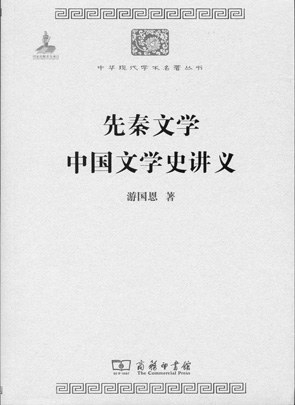You Guoen’s reflections on Chinese literary history

Pre-Qin Literature and History of Chinese Literature
Author: You Guoen
Publisher: The Commercial Press
Literary history emerged as a discipline in China at the same time that modern Western science was first popularized on a mass scale in the East. After the abolition of the imperial examination system in the early 20th century, the discipline was established based on concepts and research methods borrowed from the West.
Chinese literary history continued to flourish in the patriotic climate inspired by the May Fourth Movement. For You Guoen’s generation, who stepped onto the stage in the 1920s, literary history was an unexplored frontier.
In his book Pre-Qin Literature and History of Chinese Literature, You first pointed out the importance of literary history. He said: “China has a long history that generated many writers and literary works. Relations between literature and politics and society are too complex to be sorted out. Therefore we can use literary history to help us know the essence of these relations.”
“So how can these aspects be examined?” he asked. “First, illuminate the development and changes in literature. Second, analyze the reasons for the rise and fall of certain literary genres. Third, testify as to the authenticity and confirm the chronological order of these literary works. Fourth, estimate the works’ value.” These became guiding principles for later generations of scholars in this field.
Next, he identified ancient books with rich literary value. You outlined the origin of Chinese civilization and the early development of Chinese literature. Being an expert in the literature written before the Qin Dynasty (221-207 BC), You specifically wrote a chapter for fiction from this period. He classified the fiction into four categories: songs and proverbs, legends, fables and parables, and finally argot and vernacular.
Then, You introduced the origins and boundaries of literature. He illuminated the reasons for the rise and fall of various literary genres in rich detail, while highlighting notable writers and lauding the virtues of folk tales.
One important aim of You’s book is to confirm historical facts. Chinese literary history is so long that the authenticity of many materials had to be verified. In order to ensure that the content of these literary works was true and reliable, You investigated the truth of all important literary works, coming up with new ideas on the old research.
You also investigated the influence of external environments on writers and the development of literature by examining the historical background, political and economic conditions, features of the times and social trends. He contended that literature reflects the society and poetry echoes politics. For example, when it comes to the literature from Three Kingdoms period (220–280) to the Northern and Southern dynasties (420–589), You elaborated on the transformation of thought trends in literature, artistic outcomes of the corruption of social morality and thriving knowledge of metaphysics, and analyzed the impacts on Tang Dynasty poetry of the emphasis the Jin Dynasty (265–420) placed on poetic rhyme.

 PRINT
PRINT CLOSE
CLOSE